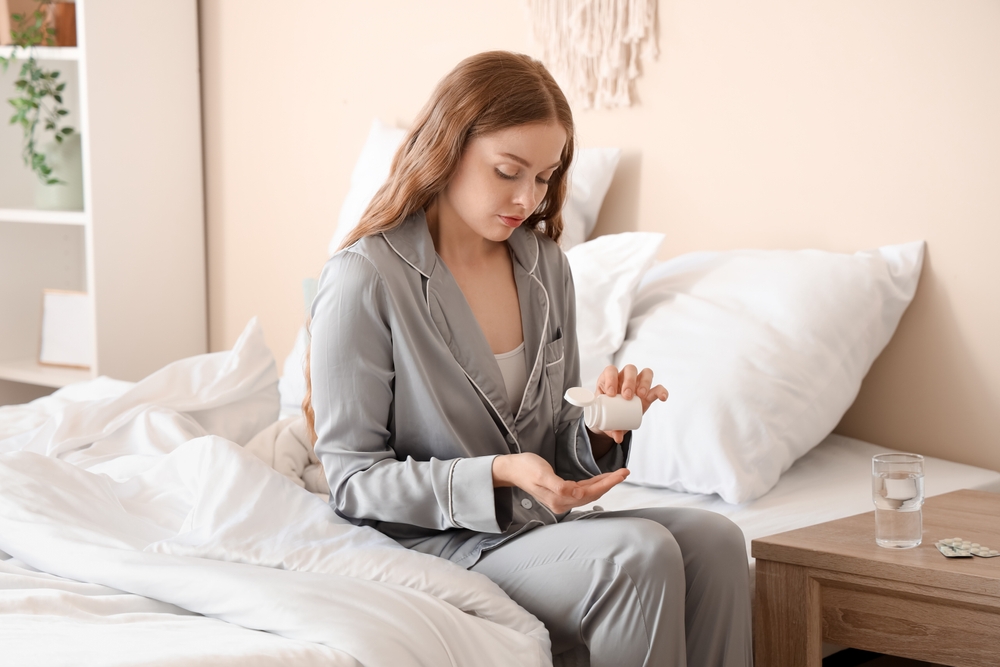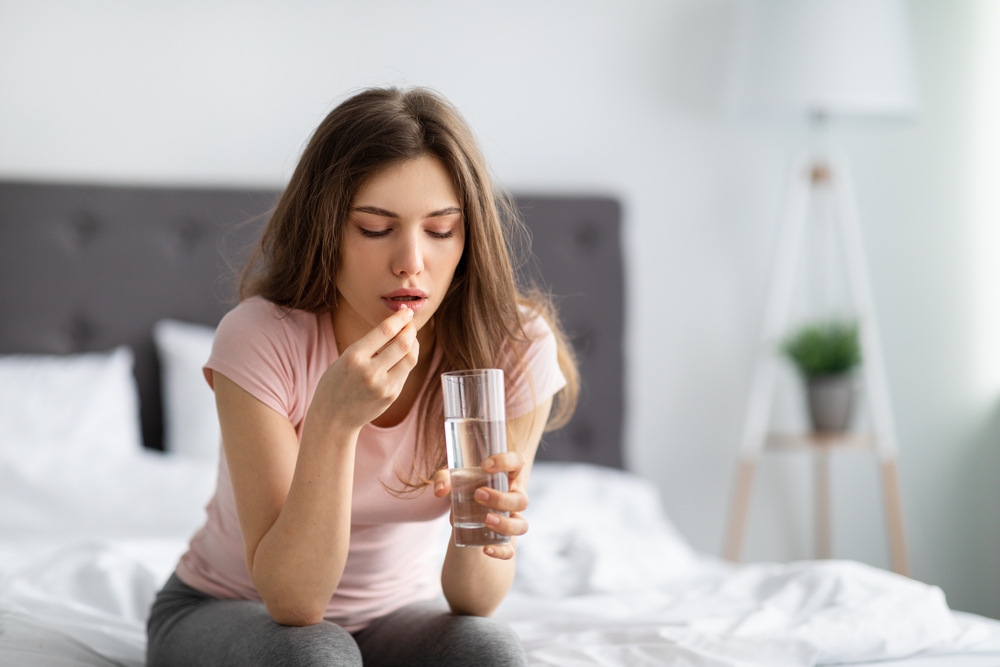Last Updated:
July 28th, 2025
Sleeping Pill Addiction | Signs, Causes and Types
Sleeping pills are prescribed to more than a million people in the UK each year, reflecting a global pattern of heavy reliance on these medications. As the use of sleeping pills climbs so does the risk of sleeping pill addiction, a problem that has become very serious both domestically and worldwide. The dangers of sleeping pills addiction can be just as perilous as an addiction to illicit drugs. Understanding how and why sleeping pill addiction develops and where to get help is crucial for managing and mitigating the risks.

What are sleeping pills?
Known in the medical world as hypnotics or sedatives, sleeping pills have been helping people overcome sleep issues for decades. Over that time, sleeping pills have evolved and expanded in variety, and there are now a number of natural, prescription and over-the-counter sleeping pills available. Each type is designed to help tackle different sleep issues and include:
Struggling with an addiction? If you are ready to seek help, reach out to us today, and a member of our compassionate team will help you find the best option for starting your recovery journey.
What is a sleeping pill addiction?
A sleeping pill addiction means being stuck in a cycle where you can’t stop taking sleeping pills, even though they are doing more harm than good. While this is typically seen when people become addicted to their prescription sleeping pills, it can also arise from using pills to feel high, cope with unhappiness or alleviate stress.
When you use sleeping pills for a long time, they might start to lose their effect. The natural response might then be to increase your dosage which can cause the medication to accumulate in your system. Over time, this builds a physical dependency which conditions your body and brain to rely on the drug for normal operation. Should you decide to stop or reduce your use, you will experience withdrawal symptoms like rebound insomnia, intense cravings and severe anxiety.
But a sedative addiction is also a mental battle. When you use sleeping pills heavily over an extended period, you can begin to believe they are vital for your life. This creates a major barrier to stopping as the fear of facing a day (let alone a night) without sleeping pills can become too much to cope with.
Some common sleeping pill addictions include:
Zolpidem addiction
Zolpidem (Ambien) is an effective sleeping pill but it carries a significant risk of addiction if misused. Taking it without following medical advice or in doses larger than prescribed can lead to rapid addiction development.
Zopiclone addiction
Similarly, Zopiclone (Imovane) can become addictive if you misuse it by increasing the dosage beyond what is prescribed or using it to feel high or to manage stress or other issues.
The warning signs of sleeping pill addiction
If you are worried you may be developing a problem, watch out for these key addiction signs and symptoms:
- Feeling like you need sleeping pills to cope with daily life
- Craving sleeping pills when you haven’t taken them for a few hours
- Suffering from withdrawal symptoms when you try to quit or reduce your usage
- Concealing your sleeping use from friends and family
- Obsessing over obtaining and taking sleeping pills
- Taking more than prescribed or without a prescription
- Not quitting, even though these problems are obvious
If these behaviours sound familiar and stopping on your own feels impossible, it is time to seek professional help for sleeping pills addiction.
What causes a sleeping pill addiction?
On a chemical level, sleeping pill carry a built-in risk of dependency, especially if you don’t use them correctly. But there are some other things that can greatly up your chances of becoming addicted:
- Not following your doctor’s instructions on how to take sleeping pills.
- Having sleeping pills too easily available makes it easy to take more than you should.
- Using them to cope with things other than sleep, like sadness or anxiety.
- Lacking knowledge about their dangers and how they should be used safely.
- No support from friends or family for stress or life’s difficulties.
- Chronic stress or unresolved trauma.
- Previous experiences with addiction or substance abuse.
- Chronic sleep issues and relying purely on sleeping pills for relief.
The mental and physical dangers of a sleeping pill addiction
The repercussions of becoming addicted to sleeping pills are profound, with both mental and physical harm possible. Being informed about the potential risks is key to using these drugs responsibly:
Sleeping pill addiction treatment in the UK
Treating sleeping pills addiction begins with a carefully monitored prescription drug detox. In this stage, your dosage is methodically reduced to help your body adapt gradually, minimising the shock often experienced with abrupt cessation. Your doctors may also administer supportive treatments to alleviate withdrawal symptoms, making your transition out of dependence as smooth as possible.
After successfully detoxing from sleeping pills, the next essential step in recovery is to understand what led to the addiction in the first place. This exploration takes place in prescription drug rehab with UK options ranging from private facilities to free NHS services.
Although each programme has its unique approach, opting for an inpatient rehab facility is often recommended. These facilities offer intensive care and create an environment free from everyday distractions, allowing you to focus fully on recovery.
Where to get help for sleeping pill addiction
If you are struggling with an addiction to sleeping pills, know that there is strong support available. Addiction Helper is your gateway to the right recovery programme for you. Reach out to us today to discuss your options and start on the path toward a healthier, more balanced life.
Our compassionate team are ready and available to take your call, and guide you towards lasting the lasting addiction recovery you deserve.
Frequently Asked Questions
(Click here to see works cited)
- Brett, Jonathan, and Bridin Murnion. “Management of benzodiazepine misuse and dependence.” Australian prescriber vol. 38,5 (2015): 152-5. doi:10.18773/austprescr.2015.055. Accessed 27 January 2025.
- UK-Rehab. “Benzodiazepine Addiction | UK Rehab.” UK-Rehab, https://www.uk-rehab.com/benzodiazepine-addiction/. Accessed 27 January 2025.
- UK-Rehab. “How to Tell If You Have Become Addicted to Sleeping Pills.” UK-Rehab, https://www.uk-rehab.com/sleeping-pills-addiction/how-to-tell-if-you-have-become-addicted-to-sleeping-pills/. Accessed 27 January 2025.
- NCBI. “Using medication: What can help when trying to stop taking sleeping pills and sedatives?” NCBI, 20 April 2010, https://www.ncbi.nlm.nih.gov/books/NBK361010/. Accessed 27 January 2025.
- Stalos, Steffini. “Sleeping Pill Addiction and Symptoms.” Health, 14 July 2022, https://www.health.com/condition/sleep/sleeping-pill-addiction. Accessed 27 January 2025.
- UK Addiction Treatment Centres. “Sleeping pills addiction | UKAT.” UK Addiction Treatment Centres, 11 October 2023, https://www.ukat.co.uk/addiction/drug/prescription/sleeping-pills/. Accessed 27 January 2025.


